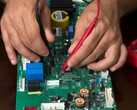In a major breakthrough for medicine, a 42-year-old man with a 37-year history of type 1 diabetes received a transplant of genetically modified islet cells from a 60-year-old donor, all without any need for immunosuppressing medications. The result — which was published in a paper in the New England Journal of Medicine — details a new procedure, which could one day offer a cure for the disease.
Prior to the trial, the patient had an “undetectable” level of insulin production. For the trial, the researchers used CRISPR-Cas12b gene editing to make them immune to the patient's immune system. To do this, they removed HLA proteins which act like foreign identifiers, then added CD47, a protein that acts like a 'don't eat me' signal. Through 17 separate injections, the doctors delivered about 80 million engineered cells into the patient's system.
For the sake of observation, the research team said they included some edited and partially edited cells. The patient's immune system immediately attacked and annihilated these cells. On the other hand, his immune system completely ignored the hypoimmune cells, which survived and produced insulin over the 12-week study period.
C-peptide measurements taken during the study confirmed the islet cells were successfully integrated and producing insulin. While this is still a proof-of-concept study, it offers hope for an alternative path to the treatment of type 1 diabetes which saves the patient the trouble of frequent insulin injections and immunosuppressants which have harmful side effects.
Source(s)
The New England Journal of Medicine
Image source: Towfiqu barbhuiya























